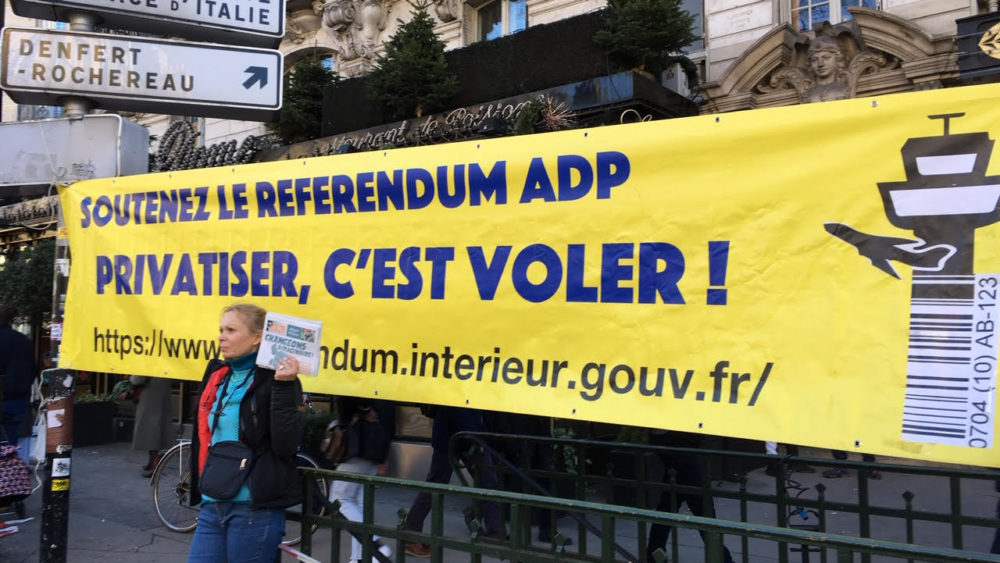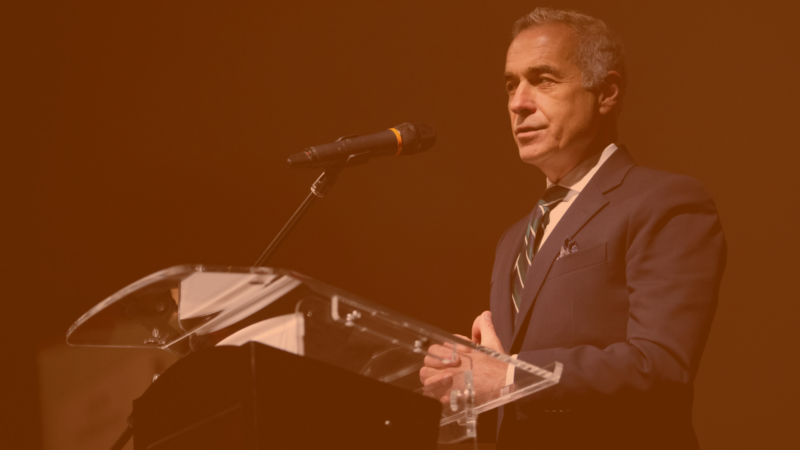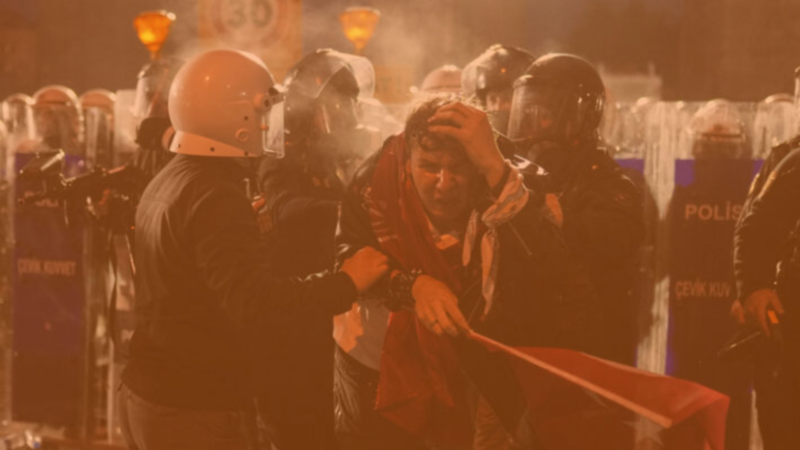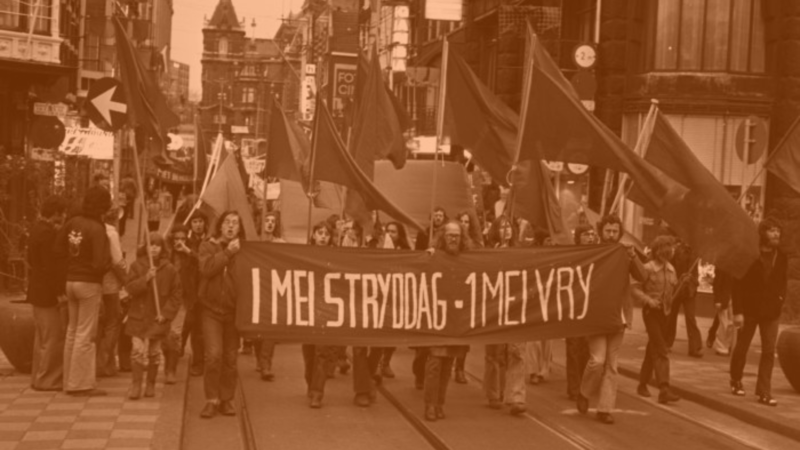“Privatisation kills!”
After having privatised La Française des Jeux (equivalent to the National Lottery) — one of the French budget’s cash cows — the government of former investment banker Emmanuel Macron presented a bill before the Assemblée Nationale for the privatisation of ADP (formerly Aéroports de Paris) in April 2019. This company owns and manages the largest airports in France, as well as other airports abroad.
For the first time in French history, members of parliament (députés) from both the right and the left joined forces, and 248 of them demanded that the French people be allowed to a referendum against this privatisation.
In accordance with constitutional requirements, such a demand would require a petition signed by at least 4.7 million French citizens (meaning, not including foreigners, EU citizens and even French citizens not registered on the electoral rolls) within nine months.
DiEM25 Paris, together with an anti-privatisation collective comprising of political parties, trade unions and citizens’ associations, fought on the streets each week for nine months to inform citizens and urge them to sign this petition. Quite conveniently for Macron, his government had not seen fit to inform the public about it through the national press, television and radio.
This airport privatisation project includes the prior investment of 6 billion euros in taxpayers’ money into these airports before selling them for around 8 billion euros. As envisaged, ADP would remain in the hands of the private sector for 70 years before being handed back to the state.
The state would be expected to compensate the future owners of ADP by a further several billion euros for the re-appropriation of ADP by the state at the end of this 70 year period. We are speaking of a sum several billion euros upfront and calculated by way of a formula; a formula whose details have not been made known to the public.
Since ADP is a very lucrative company contributing around 200 million euros per year to the state budget (therefore amounting to 14 billion euros over 70 years), any reasonable person would question the economic justification for such a measure which would also be catastrophic in terms of environment and employment consequences. Vinci, which already owns the French motorways, has declared its interest to also purchase ADP.
At a time when Macron wants to privatise every public asset of the state — such as dams, the pension system, the healthcare system, and more — governments in other countrie,s and in particular in the European Union, appear to be doing the exact opposite. There has been much public acknowledgment in other countries as to the catastrophic consequences of privatisation.
Governments throughout the world are, on the contrary, now moving towards policies of re-nationalisation or non-renewal of concessions and Public-Private Partnerships (PPPs), for example:
- In 2020, Spain is intending to renationalise its motorways,
- In the UK, after the necessary re-nationalisation of the Eastern Railway Company, the city councils of both Liverpool and Manchester have demanded that the government nationalises the Northern Railway Company (currently owned and operated by Deutsche Bahn),
- The State of California is now demanding the nationalisation of the PG&E, the company operating the state-wide power grid, due to the company’s failure to maintain and upgrade the poorly maintained power grid which is deemed to be the cause of a large number of the fires that have devastated California over the last few years,
- In Germany, municipalities have taken back control of water management.
Everywhere, the conclusion remains the same: the privatisation of public services is a resounding failure. The lack of investment and maintenance, the unreasonable increase in prices relative to the services provided to the public, the rolling out of large redundancy plans causing widespread unemployment to rise, the increase in environmental disasters… the list goes on.
In Paris, our banners for action against the privatisation of our airports announced: “Privatising is theft” (in reference to French anarchist Pierre-Joseph Proudhon, which claimed “Property is theft!”). But the Covid-19 epidemic shows us that it is more than that: to privatise is to kill!
For years the French government has favoured and rolled out programmes of austerity, deliberately prioritising privatisation. Their initiatives have included the financial support through the French Public Investment Bank of start-ups created out of spin-offs of French state labs, and the disinvestment in public services for the benefit of private companies. Before the coronavirus, French hospitals were already on strike for more than 10 months.
They were desperately trying to raise the alarm about the constant decrease of state funding, the lack of investment in recruitment and training for nurses and doctors, the lack of equipment, and the low, if not inadequate, pay of carers, while allowing the development of multiple private clinics and exclusive retirement homes.
Firefighters, electricians, postal workers, railway workers, university professors and post-graduate researchers have all been doing the same, but without being heard. We observe everywhere in Europe equivalent movements ringing alarm bells about the desperately low level of public investment, pointing at the adverse consequences of privatisations and PPPs, contesting their costs and, most importantly, their efficiency.
As the state may not always be considered the best possible employer and/or decision-maker, we at DiEM25 shall definitely also consider other alternatives including, but not limited to, cooperatives, employee-led management and other forms of managerial control.
Today, it cannot be denied that COVID-19 is an effective killer in France, and also in Italy and other European countries, in part due to such measures of austerity and privatisation. Our hospitals are not sufficiently equipped (hospital beds are at record low, the government had to admit that not enough masks, hand sanitizers, or tests are available, nor sufficient breathing machines).
There is not enough staff, and the emergency medical services of the fire brigades are overloaded. In the last couple of years, medical researchers at universities have not obtained the funds required to properly carry out the necessary research on severe respiratory diseases. Instead, state labs have been invited to work on more profitable research topics.
Today in France, as in other European countries, we indeed are observing what many have for a long time already been known, shouted loudly about, and demonstrated against: PRIVATISATION KILLS!
Do you want to be informed of DiEM25's actions? Sign up here















